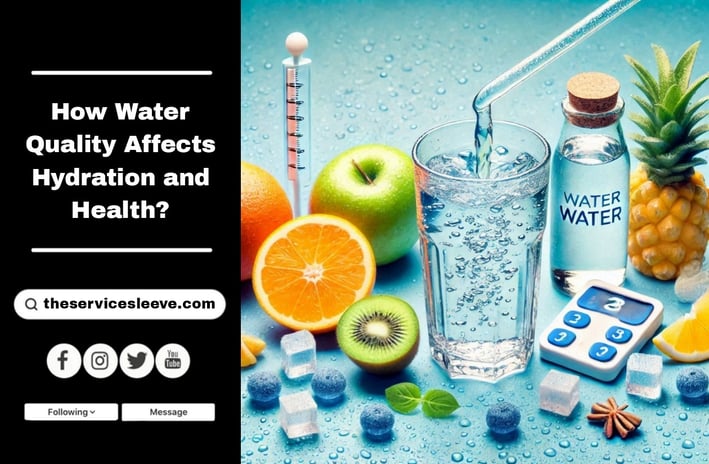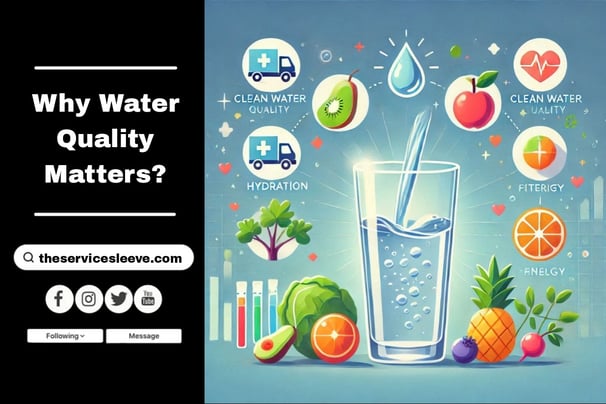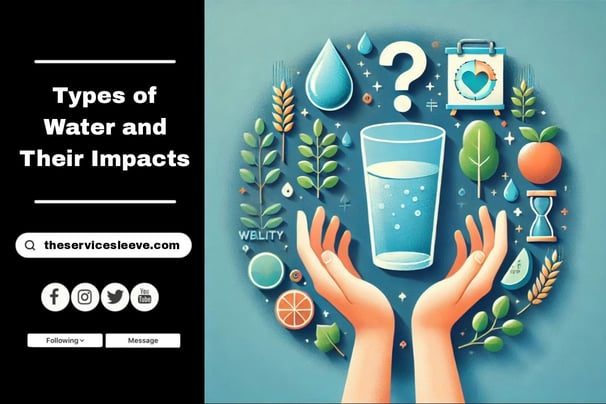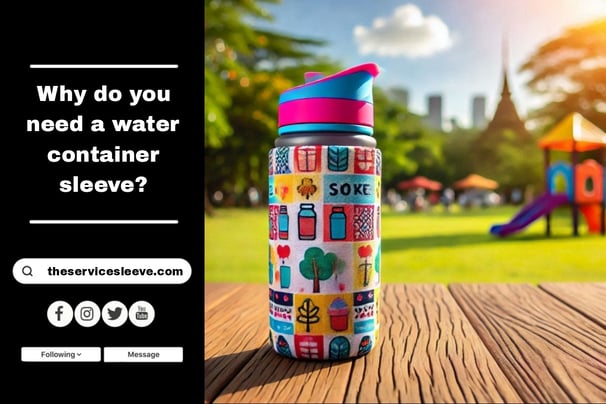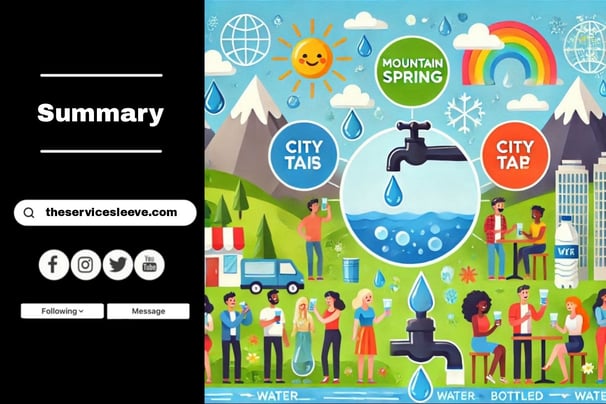Does It Matter What Kind of Water You Drink? | How Water Quality Affects Hydration and Health?
Learn how water quality affects hydration and health, and discover how our water container sleeves help preserve water purity, ensuring optimal hydration wherever you go!
HYDRATION
Introduction: How Water Quality Affects Hydration and Health?
The majority of us concentrate on our water intake when it comes to maintaining proper hydration. But have you ever stopped to consider how water quality affects hydration and health? The truth is, the type of water you consume can make a significant difference in how well your body absorbs and utilizes it. Your level of hydration and general health are directly impacted by the quality of the water you drink, whether its tap water, bottled, filtered, or mineral water.
Water that’s contaminated or lacks essential minerals can hinder your body's ability to stay hydrated effectively. On the other hand, high-quality water not only quenches your thirst but also delivers nutrients that promote better health. Understanding how water quality affects hydration and health is essential for making informed choices that benefit both your body and mind.
This post will discuss the importance of water quality, look at the different kinds of water that are available, and show you how your hydration journey may be affected by the water you select. Whether you're an athlete, a busy professional, or simply someone who wants to stay healthy, learning how water quality affects hydration and health will empower you to make better decisions for your daily hydration needs. This is just the beginning! Let's head farther into the very interesting connection between water quality and hydration!
Why Water Quality Matters?
Water is necessary for life, but not all water is equally beneficial to your health. Recognizing the importance of water in all bodily functions is the first step toward understanding how water quality affects hydration and health. Whether it is deficient in essential minerals or contains dangerous contaminants, poor water quality can interfere with the way the body functions natural hydration processes and eventually cause health problems.
The presence of impurities is one of the most important ways in which water quality affects hydration and health. Contaminants like heavy metals, pesticides, and bacteria in unfiltered or untreated water can interfere with your body’s ability to absorb water effectively. These impurities may also put unnecessary strain on your kidneys and other organs as they work harder to filter out toxins.
Conversely, good water improves hydration by supplying vital minerals like potassium, magnesium, and calcium. These minerals not only support hydration but also contribute to vital functions like muscle contraction, nerve transmission, and bone health. When your water lacks these minerals, as is often the case with distilled or overly purified water, it may fail to deliver the full benefits your body needs to thrive.
Another factor to consider in how water quality affects hydration and health is pH balance. Alkaline water, for instance, is thought to neutralize acidity in the body, potentially improving hydration efficiency and reducing inflammation.
Ultimately, water quality matters because it determines whether your body gets the hydration and nutrients it needs—or whether it struggles to cope with harmful substances. You can improve your hydration routine and promote long-term wellness by selecting high-quality water and being aware of how water quality impacts hydration and health.
Types of Water and Their Impacts | How Different Types of Water Affects in Hydration and Health:
Not all water is created equal, and the type of water you drink has a significant impact on your hydration and health. Every type of water, from tap to filtered and bottled, has advantages and disadvantages of its own. You can choose more wisely for your general health and hydration requirements if you are aware of these variations.
1. Tap Water:
Tap water is the most accessible option for many, but its quality can vary widely depending on where you live. In areas with advanced treatment systems, tap water is often safe and contains beneficial minerals like calcium and magnesium. However, in some regions, tap water may carry contaminants such as lead, chlorine, or pesticides, which can negatively influence how water quality affects hydration and health. If you're relying on tap water, using a good filtration system can help improve its safety and taste.
2. Bottled Water:
Bottled water is a convenient choice, but it isn’t always a guarantee of better quality. While some bottled water brands provide mineral-rich options, others simply package treated tap water. Additionally, single-use plastic bottles can leach chemicals into the water if exposed to heat, potentially impacting how water quality affects hydration and health. Choosing reputable brands and minimizing plastic use can make bottled water a safer option.
3. Filtered Water:
Filtered water is a popular solution for improving water quality. Using filters can remove harmful contaminants while retaining essential minerals, striking a balance that enhances how water quality affects hydration and health. Depending on the type of filter, you can customize your water to meet your specific needs, whether you’re reducing chlorine taste or targeting heavy metals.
4. Mineral Water:
Naturally sourced mineral water is rich in nutrients like Magnesium, Calcium, and Potassium, making it one of the best options for improving how water quality affects hydration and health. These minerals not only support hydration but also contribute to critical bodily functions, such as maintaining strong bones and proper muscle function. However, mineral water can be expensive, making it less practical for daily use.
5. Distilled and Purified Water:
Distilled and purified water are highly processed, with nearly all impurities and minerals removed. While these types are useful in certain contexts, such as medical applications, they may not be ideal for daily hydration. The lack of minerals can make distilled water less effective in supporting how water quality affects hydration and health, as it doesn’t replenish your body’s nutrient needs.
6. Alkaline Water:
Alkaline water has gained popularity for its potential health benefits, including improved hydration and reduced acidity in the body. Its higher pH level is believed to enhance how water quality affects hydration and health, though scientific evidence is still evolving. If you’re exploring alkaline water, ensure it comes from reputable sources to avoid artificially enhanced products with questionable quality.
You can make decisions that fit your lifestyle and health objectives by being aware of the traits of various types of water. Making quality a top priority will improve the way that water quality impacts hydration and health and guarantee that every sip promotes your wellbeing, whether you're drinking mineral-rich bottled water or filtered tap water.
Water for Specific Needs!
Different people have different hydration requirements, and understanding how water quality affects hydration and health can help you choose the right water for your specific needs. The kind of water you drink can have a big impact on your general health, whether you're an athlete, a child, or someone with a special medical condition.
1. Athletes and Fitness Enthusiasts:
Hydration is crucial for athletes because they lose more water and electrolytes through perspiration. Water that has been enhanced with electrolytes, like potassium and sodium, can help this group replace the electrolytes they lose when exercising. The effects of water quality on hydration and health can be improved with premium mineral water or specially made sports drinks, guaranteeing peak performance and recuperation. Avoid sugary or artificially enhanced drinks, as they can hinder proper hydration.
2. Children and Teenagers:
Growing bodies require more nutrients, and adequate hydration is essential for development. Ensuring that children drink clean, mineral-rich water is crucial to improving the way that water quality impacts their health and hydration. Families may find tap water to be a more affordable alternative if it is adequately filtered to eliminate impurities. You can give your children a steady supply of safe, high-quality water by installing a water filter in your house.
3. Pregnant and Breastfeeding Mothers:
The body needs more water during pregnancy and lactation. Proper hydration supports the baby’s development and the mother’s overall health. One way to help meet these increased needs is to drink water that contains enough minerals, such as calcium and magnesium. Dehydration can be avoided and the health of the mother and child can be supported by being aware of how water quality impacts hydration and health during this crucial period.
4. Individuals with Health Conditions:
Water quality must be closely monitored for certain medical conditions, such as high blood pressure, diabetes, or kidney disease. Distilled or purified water might be recommended for individuals with kidney issues, as it eliminates excess minerals that could strain the kidneys. However, for those with general health concerns, mineral-rich water may provide the nutrients needed to support how water quality affects hydration and health. Always consult a healthcare provider for personalized advice.
5. Seniors and Aging Adults:
As people age, their bodies may lose the ability to conserve water, making them more susceptible to dehydration. Seniors can benefit from water with added electrolytes to maintain hydration levels. Additionally, filtered water can reduce the intake of contaminants that may negatively impact how water quality affects hydration and health, particularly for those with compromised immune systems.
6. Outdoor Workers and Travelers:
People exposed to hot or dry conditions, such as outdoor workers and frequent travelers, need water that provides both hydration and protection against dehydration risks. Portable water filters or bottled mineral water can ensure they have access to clean, safe water, improving how water quality affects hydration and health even in challenging environments.
You can optimize your hydration benefits and gain improved comprehension of how water quality impacts hydration and health by customizing your water choices to meet your unique needs. High-quality water can make all the difference, whether you're promoting an active lifestyle, raising a growing family, or treating health issues.
Simple Tips for Choosing Better Water:
Finding out how water quality impacts hydration and health is the first step to making better decisions, and selecting the right water can be easier than you may think. You can make sure that the water you consume promotes ideal hydration and general wellbeing by following a few easy steps.
1. Check Your Local Water Quality Reports:
Begin by learning about the water quality in your area. The majority of municipalities offer yearly reports on the quality of their water, which include information on the pH levels, minerals, and contaminants present. You can decide whether your tap water is safe to drink or needs further filtration by knowing how water quality impacts hydration and health in your area.
2. Invest in a Reliable Water Filtration System:
Filtering your tap water is one of the most effective ways to improve its quality. You can select filters that eliminate particular pollutants, such as lead, chlorine, or bacteria, while keeping necessary minerals in place, based on your needs. This step ensures that you maximize the impact of water quality on hydration and health while maintaining convenience and taste.
3. Choose Reputable Bottled Water Brands:
If bottled water is your preference, always research the brand to ensure it meets quality standards. Look for options that list their mineral content and source, as these factors directly influence how water quality affects hydration and health. Avoid brands that use vague labelling or fail to provide transparency about their water source.
4. Use a TDS Meter to Measure Water Quality:
A Total Dissolved Solids (TDS) meter is a simple tool that helps measure the amount of dissolved substances in your water. While TDS isn’t the sole indicator of water quality, it can offer insights into mineral levels and possible contaminants, helping you better understand how water quality affects hydration and health.
5. Opt. for Glass or Stainless-Steel Storage:
The container you use to store your water also matters. Avoid plastic bottles that can leach harmful chemicals, especially when exposed to heat. Instead, choose glass or stainless-steel containers, which preserve water quality and enhance how water quality affects hydration and health. Pair these with water container sleeves to maintain temperature and protect against external contaminants.
6. Test Your Well Water (If Applicable):
Frequent testing is essential if you depend on a private well. High concentrations of dangerous pollutants like Bacteria, Arsenic, or Nitrates in well water can have an impact on how hydration and health are affected by water quality. Invest in professional testing services to ensure your water is safe and meets local quality standards.
7. Stay Informed About Emerging Water Trends:
Although water trends like hydrogen-enriched or alkaline water are becoming more and more popular, it's crucial to proceed cautiously. Some solutions might have scientific support, while others might enhance the way that water quality impacts hydration and health. Research thoroughly and consult with health professionals before adopting these trends.
You can take charge of your hydration regimen and make sure each drink promotes improved health by using these pointers. Making wise decisions becomes effortless when you comprehend how water quality impacts your health and hydration, enabling you to stay hydrated and thrive every day.
Why do you need a water container sleeve?
Now that we’ve explored how water quality affects hydration and health, let’s connect these insights to the benefits of using water container sleeves. Selecting high-quality water is important, but keeping it pure and at the right temperature can also help you stay more hydrated. Your choice of accessories can directly influence the convenience and quality of your hydration routine.
1. Protecting Water Quality on the Go:
Sleeves for water containers are made to protect your water from outside pollutants, preserving the purity of your drinking water. In addition to the significance of how water quality impacts hydration and health, your sleeve guarantees that your water stays fresh and clean whether you're exercising, traveling, or working outside.
2. Keeping the Water at the Ideal Temperature:
Temperature matters when it comes to hydration. Cold water can be more appealing and hydrating, especially in hot weather. Staying hydrated is made simpler and more pleasurable with the aid of water container sleeves, which help keep your water at the ideal temperature. Through the preservation of taste and refreshment, these sleeves indirectly support the ways that water quality impacts hydration and health by providing protection from the elements.
3. Encouraging Sustainable Hydration Practices:
Reusable water containers paired with protective sleeves reduce the need for single-use plastic bottles, which often degrade water quality when exposed to heat or sunlight. This eco-friendly solution aligns with the broader goal of ensuring how water quality affects hydration and health while reducing environmental impact.
4. Applicability to Particular Needs:
Water container sleeves offer an additional degree of convenience for those with special hydration requirements, such as athletes, kids, or elderly people. They make staying hydrated more enjoyable by maintaining clean, easily accessible, and appropriately cooled water. These sleeves significantly alter the way that water quality impacts hydration and health when paired with premium water.
Choosing a water container sleeve is an active step toward improving your hydration routine. It's not only about what you consume; it's also about how you keep and safeguard it. You can make sure that every drink promotes improved health and wellbeing by paying attention to how water quality impacts hydration and health and making the appropriate investments.
Summary: How Water Quality Affects Hydration and Health
Making educated decisions about your daily water intake requires an understanding of how water quality impacts hydration and health. As we've seen, the quality of the water you drink affects more than just staying hydrated. It also affects your general health, energy levels, and even certain medical requirement.
This article has emphasized the importance of selecting clean, mineral-rich water by examining the reasons why water quality matters and comprehending the different kinds of water that are available. The impact of water quality on hydration and health is further highlighted by customizing your hydration to your particular requirements, such as age, fitness objectives, or medical conditions.
You can maximize the quality of the water you drink by putting basic advice like testing your water, purchasing filtration systems, and selecting suitable storage options into practice. The advantages of how water quality impacts hydration and health are further enhanced when you combine your hydration regimen with useful accessories like water container sleeves, which guarantee that the water you drink stays pure and refreshing.
Although staying hydrated is a daily requirement, the quality of your water can make it a habit that improves your life. Keep in mind that even minor adjustments, such as improving your water storage or filtering your tap water, can have a big impact as you prioritize how water quality impacts hydration and health. You now have the knowledge and resources necessary to make wiser choices that advance your sustainability, well-being, and health objectives.
Make every sip matter, stay hydrated, and maintain your health!
……………………………………………………END OF THE ARTICLE……………………………………
